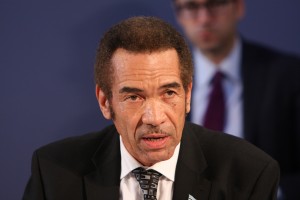After being ravaged by HIV/AIDS in the 1990s, Botswana has risen from the ashes to give a new meaning to the phrase “economic revival.” Common sense choices and a spirit of self-discipline have helped reduce the number of people dying to the virus and a robust democratic political and governance landscape has catapulted the country to high rankings in all major human development measures.
For a landlocked country, being the fastest growing economy in sub-Saharan Africa with one of the highest Human Development Index rankings is no small feat. Its purchasing power parity (PPP) of $16,400 is the highest in Africa compared to countries like Kenya with just $1,800. The $16,400 puts Botswana in the category of Turkey and Mexico in terms of the quality of human life. It is vital to remember that 70% of Botswana is desert. So the question becomes: Why are other African countries such as the Democratic Republic of Congo, Nigeria, Kenya, South Sudan, Cameroun, Niger, and South Africa behind despite the immense natural resource endowment within their borders?
The answer lies in crafting polices that revolve around the respect for institutions. Laws are not made to be broken. The leaders in Botswana understand this. When laws are broken, the lawbreakers are asked to take responsibility and bear the cost. This is also implemented. The folly of nepotism, favoritism, and several other stupid “isms” that have pulled the rest of sub-Saharan Africa behind are unheard of in Botswana. The homophobia that saw South-Africans expel fellow Africans from their neighborhoods is alien to Botswana. They understand that by welcoming others, they get to learn a thing or two.
The legislative body in Botswana knows its work-to serve the people. Therefore, self-seekers with narrow ambitions of amassing wealth such as those in parliaments in Kenya, Nigeria, South Sudan, and indeed several other African countries are not welcome in Botswana. It is a trend that has transformed the once poorest country in the world to the economic powerhouse it has become. While 38% of Kenyans and 46%of Ugandans live in absolute poverty, only 2% of the people of Botswana live in absolute poverty. Up to90% of Botswana young men and young women graduating from its tertiary institutions are assured of a job. 97% of graduates from Kenyan tertiary institutions are unemployed. This is why most of them flock to Botswana for jobs.
In Botswana, policies are always implemented in a manner that benefits the nation. There is national consensus that national treasures deserve protection from all. Therefore, the out-of-control poaching that has decimated elephant populations in Kenya will resemble an action movie in Botswana. The education system is continually being examined and changed and innovative business ideas are backed by a government that is actively involved. Everyone respects the courts and no one is above the law. Police corruption that is at 97% in Kenya stands at a mere 2% in Botswana. In other words, you can expect a police officer in Botswana to pick a lost wallet with $ 3,000 and take the wallet and its contents to the “Lost and Found” counter in the public square. In Nigeria, a police officer will create charges to drive you into bribing him where he will set the limit of the bribe at $ 3, 000, all the amount in the wallet.
Hospitals, both private and public, understand the need to uphold professionalism. They understand the value and significance of what they do and take it seriously.
Is it completely bright in Botswana? The answer is no! The country has challenges. Scarce natural resources, a small population (fewer than 3 million people) that limits the pool for human resources and overreliance on foreigners are some of the challenges the country faces. But the good thing is that the country’s leaders have already identified these issues and are tackling them.
What the rest of Africa can learn from Botswana
The answer is a simple as it is complicated-Respect institutions. Stick to professional ethics. Have compassion for future generations. African leaders who are busy looting public resources lack the compassion to understand that they are responsible for millions of kids dying of hunger and missing out on education and healthcare. Botswana leaders seem to have understood this. At least, there is one country in Africa that makes us believe that Africans are not the children of a lesser God. It is possible to rise above narrow interests, the foolishness of nepotism and favoritism, and the myopia of primitive collection of wealth for the self….it is possible to rise above all these to the majestic heights of the national interest.
By The Centre for African Progress Team
October 12, 2014.

